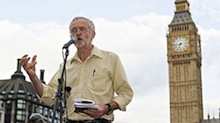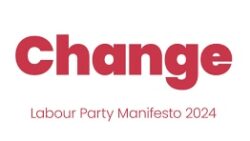Only time will tell whether Jeremy Corbyn’s election as Labour leader is the beginning of the party’s renewal or yet another stage in its decay. It’s a question of head as well as heart, says JONATHAN TIMBERS.
Jeremy Corbyn’s overwhelming election vcitory by a new mass Labour Party could be a sign that public discourse is open to left-wing ideas. Indeed, his position as party leader may help to lend authority to those ideas. Even if he doesn’t win the next election, he may be laying the foundations for a fundamental shift in politics.
 Certainly, his willingness to adopt centre-left economics about ‘the strategic state’ and ‘people’s QE’ suggests that he can inject credible new approaches to economic organisation into the mainstream. And his ability to communicate emotionally, without spin, may help Labour recover its most important political quality, authenticity, without which it is doomed.
Certainly, his willingness to adopt centre-left economics about ‘the strategic state’ and ‘people’s QE’ suggests that he can inject credible new approaches to economic organisation into the mainstream. And his ability to communicate emotionally, without spin, may help Labour recover its most important political quality, authenticity, without which it is doomed.
However, the latest polls indicate that the “tsunami [of support] on which Jeremy surfed”, to quote the Rt Hon Jon Trickett MP at a recent ILP event, might be about to break on the shore.
The most obvious reason is economic credibility. Polls of public attitudes towards Corbyn – which were consistently negative for Ed Miliband in the lead-up to the last election – do not make for hopeful reading.
Only a very small proportion of the population trust him on tax and spending (28%), and about a quarter of Labour voters don’t trust him on the economy either. Since Corbyn’s main message is that you can’t reduce the deficit by cuts, you must grow the economy through investment, this is bad news.
If he is to gain people’s trust Corbyn must become more economically literate. At the moment, he seems to think that the only way the economy will grow is through state investment. While investment in infrastructure in the UK is appalling, and must be tackled, one-off projects will not revive the economy for long. It will only grow sustainably when businesses start up and expand, and when capital is invested in long-term projects.
That can only happen if the state operates more boldly than it does now – you only have to compare the UK with capitalist Singapore, with its incredible state-led investment in housing, transport, education and health, to see the truth of that. But the point of state investment is not that it substitutes for private-sector growth, more that it creates the conditions in which the private sector can thrive. That is what ‘the strategic state’ is all about.
Corbyn has played fast and loose with economic figures. He implies that the £120 billion a year that disappears in tax evasion and avoidance can be used to plug the gaps in public finance. In fact, the Tax Justice Network, the source of Corbyn’s figures, reckons that only £20 billion a year is recoverable (HMRC, of course, says it’s about £5 billion).
Corbyn also claims he wants to renationalise the utilities (not without good reason, in some ways, as even the right-wing Centre of Policy Studies says that households could be £92 a year better off if the system was renationalised). Unfortunately, the day after the Financial Times pointed out that renationalisation would cost the taxpayer at least £124 billion shadow chancellor to be John McDonnell rowed back from Corbyn’s statement, saying that Labour believed in ‘nationalisation from below’ – in other words, community-owned renewable power generation. This sort of confusion won’t be tolerated for long by voters.
Then there is the stupid claim that business sucks up £93 billion of corporate welfare. This figure, lazily picked up from a Guardian article, includes tax reliefs that are essential to the growth-led recovery Corbyn wants. This laziness needs to end, or Corbyn’s leadership will be short-lived. If he alienates the whole of the business community, he will go down the same road as ‘Dead Ed’.
A huge opportunity
He has to rein in finance capital – no easy task. If he is to do that, he must show that it works against the interests of productive businesses and get some backing from that side of the economy.
He should be talking now to John Mills, Labour’s most important erstwhile business backer. Mills has put forward his own plan to save the British economy, and reduce inequality and poverty, with former leadership contender and author of Labour’s 1987 manifesto, Bryan Gould.
This involves devaluing the pound and rebuilding our manufacturing base. Devaluation is one of the ‘negative’ effects of people’s QE (which would also increase inflation – a good thing in the current economic context). Mills doesn’t rate people’s QE (he’s wrong about that in my view) but bringing him into dialogue would help Corbyn’s credibility.
By all means, let Mills fund centrist think tanks rather than the party, so they come up with business-friendly social democratic economic alternatives. That could only be a good thing – Corbyn’s Labour can always filch the best ideas, and it could lead to a rebirth of discussion about real alternatives to austerity in the party and the country. But Corbyn needs to show that he gets business, that he likes it when it behaves well, and that he can work with it to reduce inequality, poverty and make people better off.
Corbyn also needs to stop acting like a left-wing schoolboy. Not singing the national anthem at a Battle of Britain commemoration makes him look like a fool (as did his subsequent excuse). You sing the national anthem at events like that out of respect for those who fought, many of whom, like my father, were right-wingers who served for ‘king and country’.
Personally speaking, I loathe the national anthem, but since my dad actually risked his life fighting Nazis in the Arctic and the Mediterranean (as did Prince Philip by the way), I’ll sing ‘God save the Queen’ out of respect for him, and I expect Labour’s leader to do the same. Between them, they did more to stop fascism than the Anti-Nazi League.
Not kneeling to the Queen however is another matter. You should pick your fights carefully. Corbyn needs to learn how to do that, and perhaps the time is right to insist that we should look the monarch in the eyes.
Corbyn’s election represents a huge opportunity to make politics different and to show the way to a more civilised society. When Corbyn speaks up for that, he speaks directly to my heart. But he needs to get his head properly screwed on if he’s going to help people escape the hell the Tories are making for people like you and me.
—-
Read the ILP’s Statement on the Labour Leadership Election here.
Jon Trickett MP was speaking at the ILP’s joint conference with Compass on ‘The Politics of Radical Hope and the Labour Party’. Reports from the conference will be available on this website.



28 September 2015
It’s interesting to read McDonnell addressing some of the concerns I raise in the article in his pre conference speech interview with the Guardian. However, it shows much sloppy thinking and exaggeration characterised their political positions before Corbyn was elected leader. Now McDonnell is admitting uncertainty about how much can be collected from tax avoidance and waivering (unfortunately) on People’s QE (though presumably it couldn’t be introduced with out Bank of England support, so he needs to talk about borrowing as well).
http://www.theguardian.com/politics/blog/live/2015/sep/28/labour-conference-john-mcdonnells-economy-speech-politics-live
27 September 2015
Good and impressive interview by Jeremy Corbyn on the BBC Andrew Marr Show this morning. Corbyn came across as an an honest, compassionate and likeable new-age politician quite unlike the picture painted by our free press and some of Labour’s Westminster MPs.
What a welcome breathe of fresh air from the non-answers and vacuous spin usually served up by the likes of David Cameron and most Tory, Labour and Liberal MPs.
You never know, it’s just possible the British public might just start to see behind the daily menu of vilification, lies and doublespeak served up by the Murdoch press and Westminster politicians, by make their own minds up as to whether or not Jeremy Corbyn is a hard-left Marxist, Putin fellow-traveller, a bit of a nutter, and an existential threat to our fragile democracy, Parliamentary institutions and to the British way of life. Hope so!
So the nation’s right-wring scribes and bully-boys, together with some Labour MPs and noble Lords, so used back-stage fixing, double dealing, machine politics and getting their own way, must be in a state of utter despair and be pulling their hair out. Well those who, unlike me, have hair.
27 September 2015
I welcome Jonathan Timbers’ carefully balanced response to the election of Jeremy Corbyn as leader of the Labour party. Unlike many on the left, I did not find the recent election offered a clear-cut choice. While Corbyn was the only candidate who opposed austerity, and appeared to offer a fresh way of doing politics, to vote for him seemed to me to entail an enormous gamble with Labour’s future. This matters because there is at present, and for the foreseeable future, no other political alternative to the Tories.
Like it or not, Britain has a profoundly conservative culture (the phrase is the ILP’s) with many of the main opinion forming institutions ranged against the left. Added to that is Corbyn’s lack of support amongst Labour MPs, and his lack of front bench experience. Also, he has occasionally appeared to echo some of the less savoury attitudes prevalent in the anti-war and pro-Palestine movements. Surely, for example, he should be able to condemn ISIS outright, without the “obligatory” criticism of the US in the same statement.
However, Corbyn’s candidature also offered the opportunity of delivering a much-needed shake-up to the Labour Party. Ever since Neil Kinnock began moving Labour to the right in the late 1980s, the party has lost the opportunity to say “we told you so” on numerous issues – nuclear disarmament, council house sales, tuition fees, to name a few. Party policy has not been consistent, hence the complaint that people no longer know what Labour stands for. Ed Miliband began inching the party leftwards, but it’s dominant characteristic was a lack of courage, epitomised by its failure to challenge the Tory slur that Labour crashed the economy by over spending. At least Corbyn does not lack political courage.
So now that Corbyn has been elected with a huge majority, I have no hesitation in supporting his leadership, critically of course. I can only hope my doubts were unfounded. We desperately need an effective opposition to the Tories. During the Blair and Brown years many of us felt that there was no really credible political force representing the interests of working people.
I agree with Jonathan that Jeremy Corbyn should have sung the national anthem, just as I’m sure atheists sing hymns at Christian funerals, and for the same reason, out of respect. (Although what a mean and petty attack from the Tory press)! I think he should make it clear he is simply conforming to custom, while arguing that some customs would benefit from change.
After a mixed beginning, there are hopeful signs – the new leader’s declared intention to be conciliatory and seek consensus, his good natured persona and his reasoned approach. If he continues in that spirit, gets the right advice, if splits can be avoided, and above all, as Jonathan says, if he can develop a credible economic policy, his election could turn out to be the best thing that has happened to the Labour Party for years – but he faces a gigantic task .
27 September 2015
Jonathan is right to question whether the election of Jeremy Corbyn means that the Party will move beyond hope and agree a viable economic strategy that is social democratic, fair and inclusive in character and able to challenge the prevailing neoliberal orthodoxy.
Whether the new leader or anyone is able to perform this conjuring trick and hold together a divided and fractious Labour Party is anyone’s guess. So while it could be the start of Labour’s renaissance it might be equally speed up its disintegration and demise?
Establishment Trolls
But the signs are not great insofar as, in addition to the usually suspects, press, city, big corporations, colonel blimps and establishment lackeys being in full-blooded attack mode, there is a sizable number of disaffected Labour grandees and MPs plotting mutiny, briefing against Corbyn and using the Murdoch and right-wing press to spread gossip, talk up splits and make mischief. Labour MPs and Lords, miffed at not being listened too by troublesome plebs, busy stirring up trouble, spreading rumours and talking up splits and political fault line, that goes way beyond the ILP principles on tolerance and political debate, and who are metaphorically putting up two fingers to the concept of one-member-one-vote, democracy and decision making.
So we have Labour MPs, in an unholy alliance with the establishment, writing exaggerated, false, derogatory and insulting statements about the leader of the Labour Party, in classic school bully fashion but without the excuse of immaturity and youth – those who focus on the trivia, on Jeremy Corbyn’s dress sense, his failure to sing the national anthem, and his temerity at attending a meeting with constituents facing a dire housing crisis, rather than supporting England at Twickenham, and because he might not might not kneel before the Queen.
So like Michael Foot and Ed Miliband before him, but on a much greater scale, Jeremy Corbyn is being subjected – not to political debate – but to a veritable tsunami of character assignation, tittle-tattle, gossip and nastiness, supported by Labour Party insiders like Lord Mandelson, John Mann MP and others of the Blairite tribe who seemingly will do anything to protect the status quo and to undermine those who might want to challenge the political establishment, economic orthodoxy and myths associated with neoliberal capitalism.
While Jonathan is 100% right to question Corbyn’s economic strategy, and to point out that politics does imply compromise and the art of the possible, I do fundamentally disagree with is his suggestion that Jeremy should sing the national anthem because that what political leaders do and out of respect for the war dead.
Of course it’s always important to be sensitive to the feelings of others and to be respectful (and Corbyn was), but being required to sing that dirge of a song (a throw-back from Empire) will simply perpetuate the idea that some people, by virtue of birth and position in life, are more important than others, and that sycophancy and doffing-your-cap to important people still have a part to play in a modern democratic Britain (sic).
Many of our soldiers died to protect their country and loved ones and because they didn’t want bully boys stifling freedom of thought and free speech. So when the music plays, keep your mouth shut Jeremy, I say.